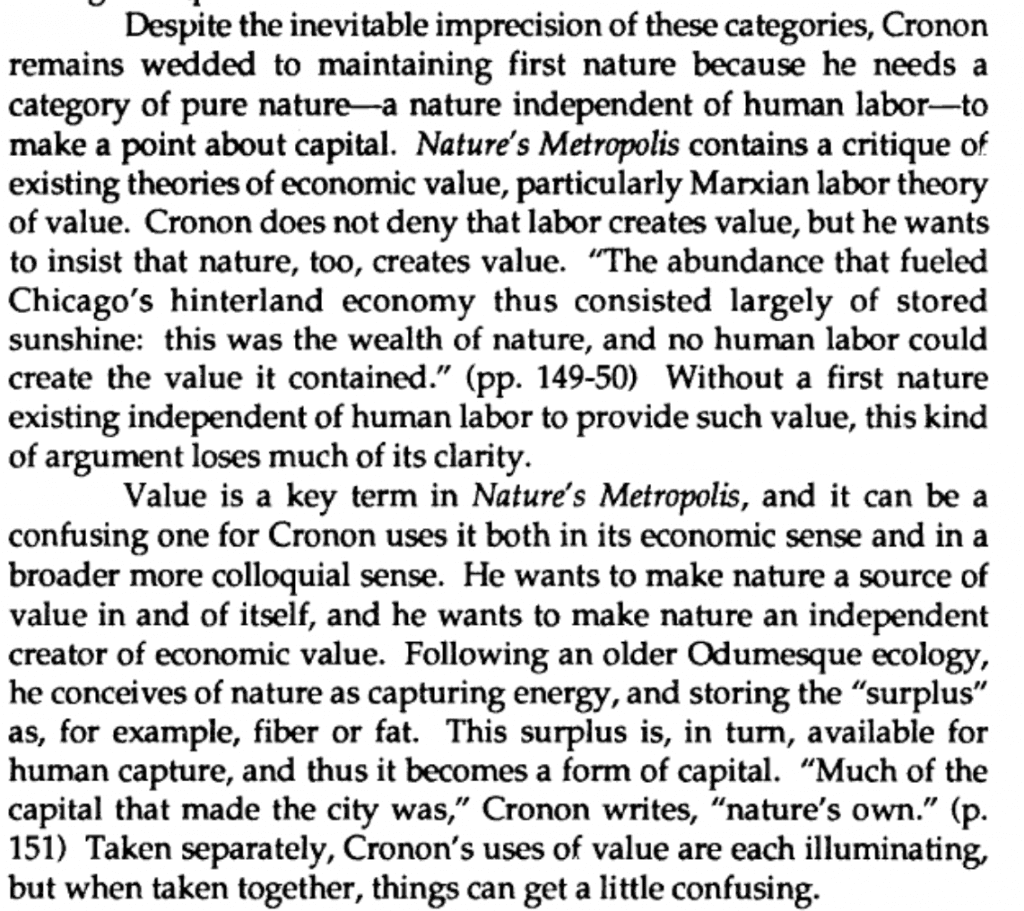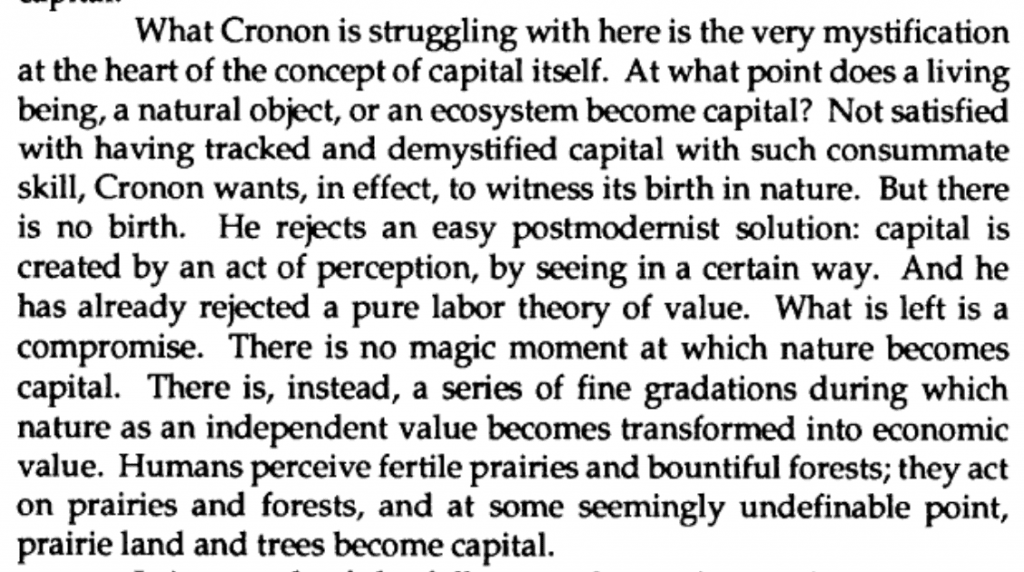MY NOTES
In order for a union to form and have power, what must be recognized in order to be resisted? Who asserts a form of confidence- power exerts confidence by delineating and then controlling the boundaries of the given system; it does so by playing a confidence game of telling you this is “inexorable,” a teleological present (all roads led to… best for humanity)
What is this Multispecies Union demanding? and to whom?
(Look for precedents: IWW, et al)
LABOR
Labor is not organized in ways that can speak of “true” or complete volition (needs definition- self-enclosed agency?). There is no way for an organism, species or ecosystem to systemically (or systematically) account for the entangled, unknown effects and influences that comprise the earth. Latour, in writing about Lovelock’s notion of a Gaian “democracy” — states that “there is no living or animated thing that obeys an order superior to itself, and that dominates it, or that it just has to adapt itself to, and this is true for bacteria as much as lions or human societies. This doesn’t mean that all living things are free in the rather simple sense of being individuals, since they are interlinked, folded, and entangled in each other. This means that the issue of freedom and dependence is equally valid for humans as it is for the partners of the above natural world.“
Lovelock wrote that “The Gaia hypothesis implies that the stable state of our planet includes man as a part of, or partner in, a very democratic entity.”
To which Latour responds that “taking on board such a world had nothing to do with ecology, but quite simply with a politics of living things.“
Labor (production) produces artifacts.
The accumulation of those artifacts is held within a complex set of systems – held as value, held as detritus, and must be dealt with and processed. Perhaps as many as (or more) of those artifacts are actually undesirable, and unproductive: the model of “the human production of artifacts through labor” produces detritus: the dross, chaff, refuse we cannot refuse, the excess or waste that must be discarded, ignored, disassembled, decomposed, or reused? (see Jennifer Gabrys and the Waste scholars fellowship at CENHS).
– Are fungi and some bacteria laboring as decomposers, cleaning up waste?
– Examples of species who produce artifacts (both productive and incidental to production?)
Human Labor power is not the only power Capitalism needs to operate
As I learned (and believe) earlier, women labor to give birth to laborers and are uncompensated. This reproductive labor might be seen as a “natural” supply, in the “natural” order of things-that-can-be-harnessed.
Elements of the more-than-human world also labor and are unrecognized. A laborer differs from a natural resource, with its implication of inertia. Watch a movie like Honeyland, or watch leaf-cutter ants farm, or check ou the assemblages that afford traditional methods of rice production to move with, not against, seasonal and species constraints and flows (see Rice Child by Elaine Gan for instance).
William Cronon in his book “Nature’s Metropolis” outlines two forms of nature, a first nature that is operating without human engineering/interventions. First nature has an intrinsic value to the “accumulation of capital”, and is far from simply ecosystem services. Its value derives from this first nature (soil riches for instance) not second nature (intervened, unimpeded by intensive human processes). Nature is labor, not resources, not inert.
[John: am i correct in interpreting this as an extension of the traditional notion of economic capital?
Cronon argues that you cannot tease out the history of “first” (natural) nature and “second” (human-constructed) nature, and that the two were melded together largely via the connections of a capitalist market. The demands of the market necessitated a new order to be grafted onto “first” nature, one that established Chicago in a spatial web of connections between the city itself, its hinterland, and markets in the east. Crucially, this process depended on transforming natural material into tradable commodities, one of the many ways in which capital served to suppress and hide the reality of the very connections and processes on which it relied. LINK


A General Strike vs Collapse as a Form of Resistance
Multispecies Strike. Already happening. No work. Bees, bats, frogs: not working. Rivers, streams, salmon: blocking and blocked. A waning of reproduction because of endocrine disruption from plasticizers.
Ecological collapse and its connection to general strikes, organized resistance. The relationship to time, and expectations of temporal speed without consequences.
Time
Accelerated temporality, violent insistence that capitalism imposes on all beings, biologically, socially, etc.
TERMS
Work:
for money, reproductive labor, the work of molecules, agentic forces that “work” on a planetary scale
OED:
Work /wərk/
Old English weorc (noun), wyrcan (verb), of Germanic origin; related to Dutch werk and German Werk, from an Indo-European root shared by Greek ergon .
NOUN
1. activity involving mental or physical effort done in order to achieve a purpose or result.
2. a task or tasks to be undertaken; something a person or thing has to do.
3. something done or made.
4. a place or premises for industrial activity, typically manufacturing.
5. the operative part of a clock or other machine.
6. (military) a defensive structure.
6. (physics) the exertion of force overcoming resistance or producing molecular change.
7. (informal) everything needed, desired, or expected.
VERB
1. be engaged in physical or mental activity in order to achieve a result; do work.
2. (of a machine or system) operate or function, especially properly or effectively.
3. (of a plan or method) have the desired result or effect. (i.e. “work miracles”)
4. bring (a material or mixture) to a desired shape or consistency by hammering, kneading, or some other method.
5. move or cause to move gradually or with difficulty into another position, typically by means of constant movement or pressure. (i.e. “work out the knots”
6. bring into a specified state, especially an emotional state. (i.e. “worked himself up”)
Labor:
to toil, to exert
OED:
la·bor/ˈlābər/
Middle English: from Old French labour (noun), labourer (verb), both from Latin labor ‘toil, trouble’.
NOUN
1. work, especially hard physical work.
2. (in the UK or Canada) the Labour Party.
VERB
1. work hard; make great effort.
2. have difficulty in doing something despite working hard
ECONOMIC DEFINITION
Labor is the amount of physical, mental, and social effort used to produce goods and services in an economy. It supplies the expertise, manpower, and service needed to turn raw materials into finished products and services.
In return, laborers receive a wage to buy the goods and services they don’t produce themselves. Those without desired skills or abilities often don’t even get paid a living wage.
Many countries have a minimum wage to make sure their workers earn enough to cover the costs of living.
Labor is one of the four factors of production that drive supply (Labor, Land, Capital, and Entrepreneurship)
Labor is measured by the labor force or labor pool. The labor force is the number of people who are employed plus the unemployed who are looking for work. The labor pool does not include the jobless who aren’t looking for work.
(The Balance, economic terms)
Agent:
an actor in the world
OED
a·gent /ˈājənt/
late Middle English (in the sense ‘someone or something that produces an effect’): from Latin agent- ‘doing’, from agere .
NOUN
1. a person who acts on behalf of another person or group. (i.e. spies, negotiators, brokers)
2. a person or thing that takes an active role or produces a specified effect. (i.e. chemicals, change-makers)
Union:
a joining, a yoke, coming together in agreement
OED
un·ion/ˈyo͞onyən/
late Middle English: from Old French, or from ecclesiastical Latin unio(n- ) ‘unity’, from Latin unus ‘one’.
NOUN
1. the action or fact of joining or being joined, especially in a political context. (marriage, agreement, harmony)
2. a club, society, or association formed by people with a common interest or purpose.
3. (British, historical) a number of parishes consolidated for the purposes of administering the Poor Laws.
4. a political unit consisting of a number of states or provinces with the same central government.
5. (mathematics) the set that comprises all the elements (and no others) contained in any of two or more given sets.
6. a pipe coupling.
7. a part of a flag with an emblem symbolizing national union, typically occupying the upper corner next to the staff.
8. a fabric made of two or more different yarns, typically cotton and linen or silk.
9. (usa) a building at a college or university used by students for recreation and other nonacademic activities.
Organize:
to coordinate purposefully
OED
or·gan·ize/ˈôrɡəˌnīz/
late Middle English: from medieval Latin organizare, from Latin organum ‘instrument, tool’ (see organ).
VERB
1. arrange into a structured whole; order.
2. make arrangements or preparations for (an event or activity); coordinate.
Solidarity:
those who stand together because of convergent interests
OED
sol·i·dar·i·ty/ˌsäləˈderədē/
mid 19th century: from French solidarité, from solidaire ‘solidary’.
NOUN
1. unity or agreement of feeling or action, especially among individuals with a common interest; mutual support within a group.
2. an independent trade union movement in Poland that developed into a mass campaign for political change and inspired popular opposition to communist regimes across eastern Europe during the 1980s.
Multispecies
MW
mul·ti·spe·cies | ˌməl-tē-ˈspē-(ˌ)shēz
1940s; earliest use found in Bulletin of the Torrey Botanical Club.
ADJECTIVE
composed of, containing, or involving two or more species and especially biological species
Multispecies (ethnographies)
OXFORD BIOBLIOGRAPHIES
Multispecies ethnography is a rubric for a more-than-human approach to ethnographic research and writing rapidly gaining discursive traction in anthropology and cognate fields. The term is deployed for work that acknowledges the interconnectedness and inseparability of humans and other life forms, and thus seeks to extend ethnography beyond the solely human realm. Multispecies investigations of social and cultural phenomena are attentive to the agency of other-than-human species, whether they are plants, animals, fungi, bacteria, or even viruses, which confound the species concept. This entails a challenge to the humanist epistemology upon which conventional ethnography is predicated, specifically its ontological distinctions between nature and culture, human and nonhuman, subject and object. Multispecies ethnography must thus be seen as a part of a larger quest in the social sciences and humanities to replace dualist ontologies by relational perspectives, to overcome anthropocentrism by pointing to the meaningful agency of nonhuman others, and to highlight the intersections between ecological relations, political economy, and cultural representations. Multispecies ethnography however, not only acknowledges that humans dwell in a world necessarily comprising other life forms but also contends that their entanglements with human lives, landscapes, and technologies must be theoretically integrated into any account of existence.
Multispecies as an ethos that de-emphasizes the individual
The holobiont (Lynn Margulis et al) as discussed so well by Anna Tsing (for instance in this interview)
The microbial//human intra-actions for instance; the ways plants, soil, microbes, fungi are mutually influential (see the work of Elizabeth Henaff)
General Strike
OED
gen·er·al strike/ˈjen(ə)rəl strīk/
NOUN
a strike of workers in all or most industries.
WIKIPEDIA
A general strike (or mass strike) is a strike action in which a substantial proportion of the total labour force in a city, region, or country participates. General strikes are characterised by the participation of workers in a multitude of workplaces and tend to involve entire communities. General strikes first occurred in the mid-19th century and have characterised many historically important strikes.
BLACK RECONSTRUCTION IN AMERICA
In the fourth chapter of Black Reconstruction, entitled “The General Strike“, Du Bois makes the argument that after the war escalated, slaves in the Confederate states engaged in a general strike wherein they stopped work and sought to cross enemy lines.
Social Unionism vs Business Unionism
The Union as a transformative force
as a path toward liberation
CIO
James Boggs, Gracely Boggs